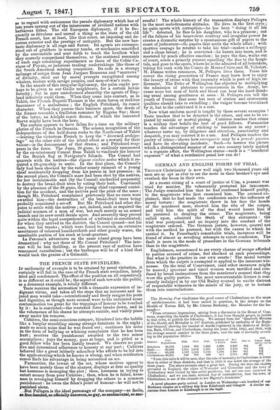GERMAN AND ENGLISH FORMS OF TRIAL.
THOUGH Christianity is now well nigh two thousand years old men are as apt as ever to see the mote in their brother's eye and overlook the beam in their own.
At a recent sitting of a court of justice at Ulm, a peasant was tried for murder. He vehemently protested his innocence. The Judge reminded him that he had confessed himself guilty, to the magistrate who first examined him. The accused ex- plained, that he had made the confession under the influence of moral torture : the magistrate threw in his face the hands of the murdered man, showed him the ribs of the corpse, and told him the spirit of the dead would haunt him if he persisted in denying the crime. The magistrate, being called upon, admitted the tenth of this statement : the trial was postponed, and an inquiry into the conduct of the magistrate ordered. The German Jurists, however, quarrel not with the method he pursued, but with the excess to which he carried it. In Feuerbach's remarkable trials, instances will be found of almost as revolting attempts to extort confession. The fault is more in the mode of procedure in the German tribunals than in the magistrate.
Englishmen, accustomed to see every chance of escape afforded to parties accused of crime, feel shocked at such proceedings. But what is the practice in our own courts ? The moral torture from which the culprit is exempted is applied to the innocent wit- nesses. On the trial of Courvoisier, (and other instances might be named,) ignorant and timid women were terrified and con- fused by broad insinuations from the murderer's counsel that they were the guiltyparties. The most unwarrantable licence is con- stantly indulged in by our Old Bailey counsel to excite distrust of respectable witnesses in the minds of the jury, or to torture them into contradictions.
The Morning Post vindicates the good name of Cheltenham on the score of salubriousness: it had been called in question, in the debate on the Health of Towns Bill, by Mr. Craven Berkeley, the Member for the bo- rough—
" From erroneous impressions, arising from a discussion in the House of Com- mons, respecting the health of Cheltenham, it has been thought proper, in=ce to that town, to publish the following. We extract from the 'Quarterly of the Health and Mortality in 117 districts, published by authority of the Regis- trar-General,' showing the number of deaths registered in the districts of Brigh- ton, Bath, Clifton, and Cheltenham, during the years 1844, 1845, and 1846, with the average annual number in the three years, and the rate of mortality accord- ing to the population 1841-
1841. Average of Per 1844.
District. popumik.. 1841. 1815. 1844. 8 Years Cent. One in Yr.stk,toseilst.
Brighton 46,742 1,084 950 1,260 1,098 2.349 42j 37 Bath. • .. 69,232 1,721 1,614 1,557 1,630 2.354 421 441 , Clifton • . 66,233 1,587 1,524 1,553 1,554 2.346 421 421 Cheltenham 40,221 829 797 806 811 2.016 491 491 •
"From this table it will be seen, that the rate of mortality in Cheltenham is lower than in either of these districts, and that in 1846 it was below the average of the three years. The above extracts show a great fact. During the time the cholera prevailed in England, the cities of Worcester and Gloucester and the town of Tewkesbury were visited by this awful pestilence, but not one case occurred in Cheltenham; and we can state, without fear of contradiction, that the town of Cheltenham is one of the cleanest in her Majesty's dominions."
A novel pleasure-party arrived in London on Wednesday—six hundred of our Northern cousins on a railway trip from Edinburgh and Glasgow. A similar ea:- cursion from London to Edinburgh is on the tape.


























 Previous page
Previous page